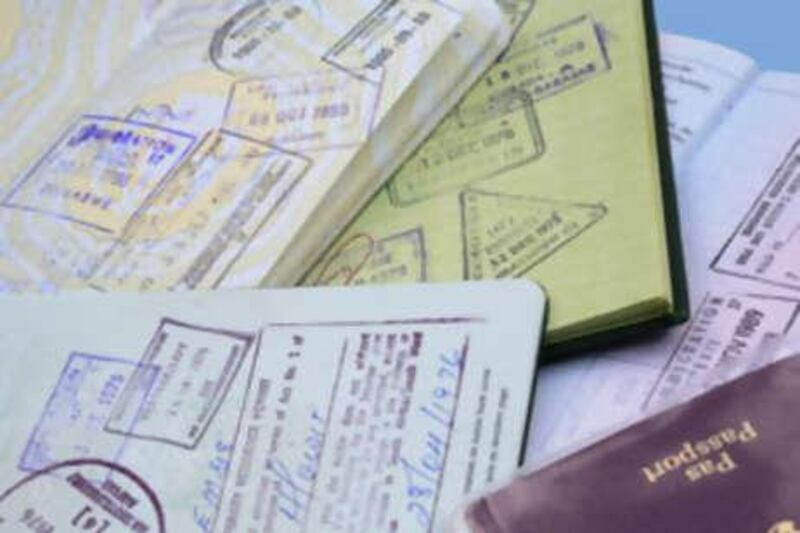ABU DHABI // The Ministry of Interior said yesterday that the country could be free of illegal immigrants by the end of the year. "We hope with the [new] visa types the Emirates will be free of violators by December," said Brig Gen Nasser Al Menhali, the acting head of the ministry's Naturalisation and Residency Administration, speaking on the eve of new visa regulations.
Officials say the new regulations, which come into force tomorrow, will make it easier to monitor people entering the country through airports, ports and border crossings. Those without valid visas would be arrested and deported by the start of 2009. The Ministry of Interior, said officials, would continue its campaigns to arrest and deport those who violated immigration laws. Yesterday, it also emerged that Sharjah's Naturalisation and Residency Department had deported 581 illegal immigrants in two dozen raids between June 1 and July 23.
No official estimates are available for the number of illegal immigrants in the country, but in March Sheikh Saif bin Zayed, the Interior Minister, told the Federal National Council that in recent years the ministry had prevented at least 200,000 deportees from re-entering the country. The amendments to the visa system, which were announced last month, have received mixed reactions, with the levying of a Dh500 fee on a visit visa proving to be the most controversial reform.
Brig Gen Menhali said: "The employees are ready, the software is in place and the visas have been printed." The new system would be subject to evaluation as it was implemented, he said. New categories include visas for study and visits for medical treatment and exhibitions and conferences. Another visa is for guests of the Government. Other reforms include creating two types of non-renewable visit visas - short-term and long-term - that will allow holders to stay for 30 days and 90 days.
Although some educational institutions would be given the power to grant visas, this status would not be conferred across the board, for fear of creating visa "traders". "We will evaluate every institute individually," said Brig Gen Menhali. Small centres offering language courses, for example, would not be able to bring in students. Similar concerns have been raised repeatedly about travel agencies. According to Ajman legislator Ali Majed al Matroushi, about 1,800 travel agents in the UAE have licences to grant visas.
Under the new rules, travel agencies and hotels can issue only visit visas and each agency must first deposit Dh75,000, refundable when the company ceases issuing visas, and a further deposit of Dh1,000 for each tourist. The same deposit is required for all types of visas. Brig Gen Menhali said the reform was intended to reduce the number of illegal workers by making it harder and more expensive to obtain a visit visa.
However, the nationals of 34 countries, mostly European and North American, will not be asked for such deposits. Instead, they will be issued a one-month visa free of charge at the border. However, renewing the visa for another month will cost them Dh500. Brig Gen Menhali said that re-evaluation of the scheme could possibly include exempting residents of some countries from paying the Dh1,000 deposit.
The visas issued before July 29 will be subject to the old bylaw, while the new visas starting from July 30 will be subject to the new law. Health insurance is now obligatory but an official from the Interior Ministry said no specific companies had been assigned to offer the service. @Email:mhabboush@thenational.ae






